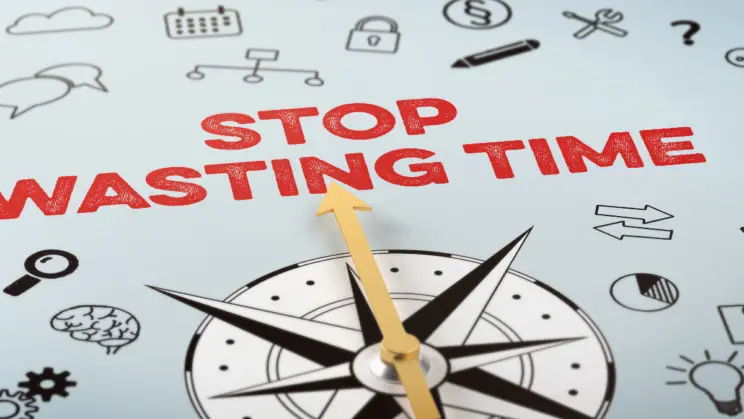Do you ever feel like you’re spinning your wheels and not making progress towards your goals? You’re not alone. We all have time-wasting habits that hold us back from reaching our full potential. Today, I will be sharing with you, 15 common habits that you may be wasting your time on and are also hindering your productivity.
The impact of time wasting on productivity
Time is a precious resource, and wasting it can have a significant impact on your productivity. When you engage in time-wasting habits, you’re essentially squandering the opportunities to accomplish meaningful tasks and make progress toward your goals. It’s important to recognize that every minute wasted is a minute you can’t get back.
One of the major consequences of time wasting is that it leads to a lack of focus and concentration. When you’re constantly distracted or engaged in unproductive activities, your ability to stay on task and complete important projects suffers. This can result in missed deadlines, decreased quality of work, and a general feeling of dissatisfaction with your achievements.
Furthermore, time-wasting habits can also hurt your mental and emotional well-being. When you spend excessive amounts of time on activities that don’t contribute to your personal or professional growth, you may start to feel unfulfilled, frustrated, and overwhelmed. This can lead to decreased motivation and a lack of enthusiasm for pursuing your goals.

15 Common Time-Wasting Habits To Break
In order to overcome time-wasting habits, it’s important to first identify and understand the specific behaviors that are holding you back. Here are 15 common habits that may be limiting your potential:
01. Mindless social media scrolling:
One of the most common time-wasting habits is mindlessly scrolling through social media feeds. Whether it’s Facebook, Instagram, or Twitter, we often find ourselves getting lost in a sea of posts and updates, losing track of time and neglecting more important tasks. Spending hours on social media without any specific purpose or goal in mind can be a major time waster.
02. Procrastination:
Procrastination is a time thief that affects many of us. Whether it’s putting off important tasks until the last minute or constantly delaying the completion of projects, procrastination can lead to increased stress, missed deadlines, and a lack of progress. Putting off important tasks until the last minute not only wastes time but also adds unnecessary stress.
03. Lack of prioritization:
Failing to prioritize tasks effectively can lead to wasted time on less important activities while neglecting more critical ones. By identifying and focusing on high-priority tasks, we can ensure that our time is spent on activities that align with our goals and bring us closer to success. Failing to prioritize tasks can lead to spending too much time on low-value activities.
04. Ineffective multitasking:
While multitasking may seem like an efficient way to get more done in less time, it often leads to decreased productivity and poorer quality of work. Constantly switching between tasks can result in fragmented focus and reduced efficiency. Trying to do multiple tasks at once can decrease productivity and hinder progress.

05. Unorganized workspace:
A cluttered workspace can be distracting and make it difficult to focus on the task at hand.
06. Overscheduling: Overcommitting and filling your schedule with too many tasks can lead to feeling overwhelmed and burned out.
07. Excessive meetings: Unproductive meetings are a common time-wasting habit in the workplace. Sitting through meetings that lack clear objectives, drag on for hours, or involve unnecessary participants can hinder productivity and prevent us from focusing on more important work. Spending too much time in unproductive meetings can take away from time spent on meaningful work.
08. Perfectionism:
Striving for perfection in everything we do can be a time-consuming habit. While it’s important to strive for excellence, spending excessive time on minor details or seeking perfection in every aspect of our work can prevent us from moving forward and completing tasks promptly. Striving for perfection in every task can lead to spending excessive amounts of time on minor details.
09. Lack of breaks: Not taking regular breaks can decrease productivity and lead to burnout.
10. Constant email checking: Constantly checking and responding to emails throughout the day can be a major time drain. Instead of allowing emails to interrupt our workflow, it’s important to set specific times to check and respond to messages to minimize distractions. Focusing on checking and responding to emails throughout the day can disrupt workflow and waste time.
11. Unnecessary multitasking: Trying to juggle multiple tasks that don’t require immediate attention can hinder progress.
12. Lack of goal setting: Without clear goals and objectives, it’s easy to get sidetracked and waste time on irrelevant activities. Failing to plan our days and weeks effectively can result in wasted time and missed opportunities. Without a clear plan and goals, we may find ourselves aimlessly drifting through the day, engaging in unproductive activities, and failing to make progress toward our objectives.
Related: How to set goals and achieve them
13. Failure to delegate: Trying to do everything yourself instead of delegating tasks can lead to feeling overwhelmed and stretched too thin.
14. Spending too much time on low-value activities like watching movies: Another time-wasting habit is excessive TV binging. While it’s okay to relax and enjoy a good show or movie, spending hours upon hours in front of the screen can eat away at our productivity and prevent us from engaging in more meaningful activities. Engaging in activities that don’t contribute to your personal or professional growth can be a major time waster.
15. Lack of self-discipline: Failing to set boundaries and stick to a schedule can lead to wasting time on unproductive activities. Here is my previous post about how to be more disciplined.

Procrastination and its effects on potential
Procrastination is a common habit that can have detrimental effects on your potential. When you consistently put off important tasks, you not only waste valuable time but also miss out on opportunities for growth and success. Procrastination often stems from fear, perfectionism, or a lack of motivation.
One of the main consequences of procrastination is increased stress and anxiety. When you continually delay tasks, they tend to pile up and create a sense of overwhelm. This can lead to feeling constantly behind, rushed, and unable to produce your best work. Procrastination can also result in missed deadlines, which can damage your reputation and credibility.
Another impact of procrastination is a decrease in productivity. When you delay tasks, you’re essentially prolonging the time it takes to complete them. This can result in rushed and subpar work, as well as a lack of time for revisions and improvements. Procrastination also prevents you from allocating time and energy to more important and meaningful projects.
To overcome procrastination, it’s important to understand the underlying reasons behind your tendency to delay tasks. Are you afraid of failure or success? Do you struggle with perfectionism? Once you identify the root cause, you can implement strategies to combat procrastination and unlock your true potential.
Related: How to plan your life well
Distractions and how they hinder progress
Distractions are one of the biggest culprits when it comes to wasting time and hindering progress. In today’s digital age, we’re constantly bombarded with notifications, emails, and other interruptions that can pull us away from the task at hand. It’s important to recognize and minimize these distractions to optimize your productivity.
One of the most common distractions is the constant need to check and respond to emails. While staying on top of your inbox is important, it’s equally important to set boundaries and allocate specific times for email management. Constantly interrupting your workflow to check emails can disrupt your focus and decrease your productivity.
Another major distraction is social media. The allure of scrolling through news feeds and engaging with online content can be difficult to resist. However, spending excessive amounts of time on social media can be a major time waster. Consider implementing time limits or using website blockers to prevent mindless scrolling and stay focused on your tasks.
In addition to digital distractions, physical distractions can also hinder progress. A cluttered and disorganized workspace can make it difficult to concentrate and focus on the task at hand. Take the time to declutter your workspace and create an environment that promotes productivity and creativity.
Related: How to invest in yourself
Multitasking and its limitations
Multitasking is often seen as a desirable skill, but the truth is that it can hinder progress and decrease productivity. When you try to juggle multiple tasks at once, you’re essentially dividing your attention and focus, which can result in decreased performance and quality of work.
Research has shown that multitasking can decrease productivity by up to 40%. When you switch between tasks, your brain needs time to refocus and adjust, which can slow you down and lead to errors. Additionally, multitasking can create a sense of mental overload and increase stress levels.
Instead of multitasking, consider implementing a more focused and structured approach to your work. Prioritize tasks, allocate specific time blocks for each task, and give your full attention to one task at a time. By focusing on one task and completing it before moving on to the next, you’ll be able to maintain a higher level of concentration and produce higher-quality work.
Related: New habits to start this year.
Lack of planning and organization
One of the major time-wasting habits that can limit your potential is a lack of planning and organization. Without clear goals, priorities, and a structured plan, it’s easy to get sidetracked and waste time on irrelevant activities. Planning and organization are essential for optimizing productivity and making the most of your time.
Start by setting clear goals and objectives. What do you want to achieve in the short term and long term? By having a clear vision of what you want to accomplish, you’ll be able to stay focused and motivated. Break down your goals into smaller, actionable steps to make them more manageable and achievable.
Next, prioritize tasks based on their importance and urgency. Not all tasks are created equal, and it’s important to allocate your time and energy to the tasks that will have the biggest impact on your goals. Create a to-do list and schedule specific time blocks for each task to ensure that you’re making progress on the most important activities.
Finally, establish systems and routines to help you stay organized and focused. This could include implementing time management techniques, using productivity tools and apps, or creating a daily or weekly schedule. By having structure and consistency in your workflow, you’ll be able to minimize distractions and optimize your productivity.
Overreliance on technology and social media
In today’s digital age, it’s easy to become overly reliant on technology and social media. While these tools can be incredibly beneficial for communication, networking, and staying informed, they can also be major time wasters if not used wisely. It’s important to strike a balance between utilizing technology and social media for productivity and avoiding their potential pitfalls.
One of the main challenges when it comes to technology is the constant need for instant gratification. We’re often tempted to check our phones or devices for notifications, messages, or updates, which can be a major distraction. Consider implementing strategies to minimize these distractions, such as turning off notifications or using apps that help you stay focused.
Social media can also be a major time sink if not used intentionally. Mindless scrolling through news feeds and engaging with online content can eat away at your valuable time. Set boundaries and allocate specific time blocks for social media use, and consider using website blockers or apps that limit your access to social media during work hours.
It’s important to remember that technology and social media should be tools that enhance your productivity and facilitate your goals, not distractions that hinder your progress. Use them mindfully and intentionally to make the most of your time and unlock your true potential.
Save the pin for later

Strategies to overcome time-wasting habits
Now that we’ve identified common time-wasting habits and their impact on productivity, let’s explore some strategies to overcome them and unlock your full potential:
- Set clear goals: Establish specific, measurable, achievable, relevant, and time-bound (SMART) goals to provide direction and motivation.
- Prioritize tasks: Determine which tasks are most important and allocate your time and energy accordingly.
- Create a schedule: Develop a structured schedule that includes specific time blocks for different tasks and activities.
- Minimize distractions: Identify and minimize distractions that hinder your progress, such as email notifications or social media alerts.
- Practice single-tasking: Instead of multitasking, focus on one task at a time to maintain a higher level of concentration and productivity.
- Break tasks into smaller steps: Break down larger tasks into smaller, more manageable steps to make them less overwhelming.
- Take regular breaks: Allow yourself regular breaks to recharge and refocus, as this can actually increase productivity.
- Delegate tasks: Learn to delegate tasks that can be done by others, freeing up your time for more important and high-value activities.
- Establish a routine: Create a consistent routine that helps you stay organized and focused on your goals.
- Use productivity tools: Utilize productivity tools and apps that can help you stay organized, manage your time, and minimize distractions.
- Practice self-discipline: Set boundaries, stick to your schedule, and hold yourself accountable for your actions and time management.
- Evaluate and adjust: Regularly evaluate your progress and adjust your strategies as needed to optimize your productivity and potential.
Final thoughts
Don’t let time-wasting habits hold you back any longer. Take control of your time, identify the habits that are limiting your potential, and implement strategies to overcome them. By breaking free from these time wasters and developing new habits, you’ll be able to reclaim your time and unlock your true potential.
Save the pin for later
